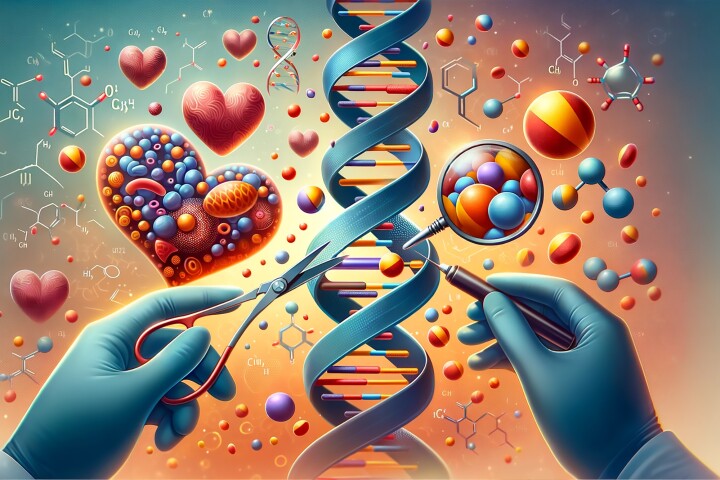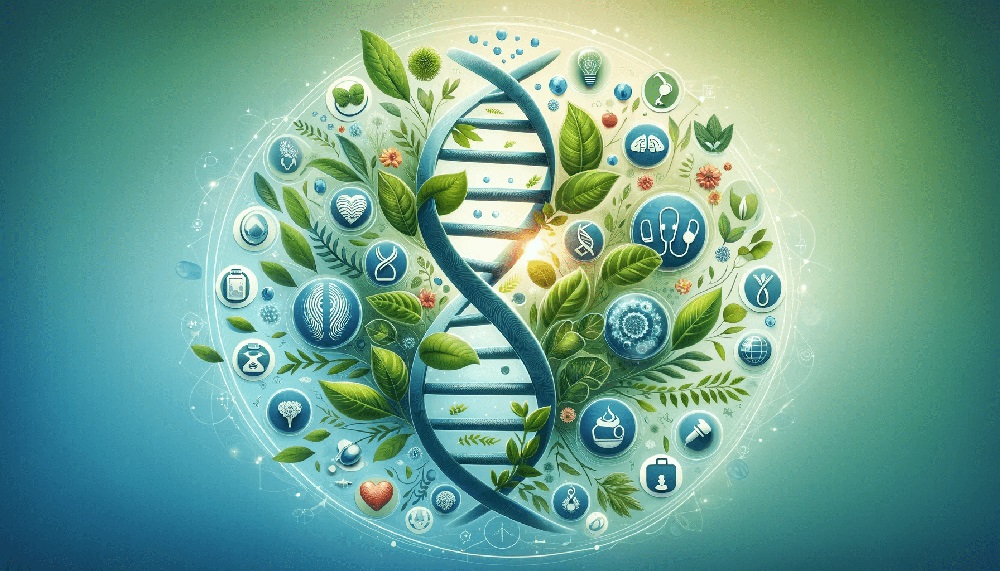Epigenetics, often referred to as the “hidden code,” provides insights into how environmental and lifestyle factors can influence our genes without altering the underlying DNA sequence. This emerging field bridges the gap between nature and nurture, helping us understand how external influences shape our biology. By regulating gene activity, epigenetics plays a crucial role in health, disease development, and even intergenerational inheritance. This article explores the science behind epigenetics, its mechanisms, and its profound implications for health and medicine.
The Basics of Epigenetics
What Is Epigenetics?
Epigenetics refers to modifications in gene expression that do not involve changes to the DNA sequence. These changes dictate which genes are turned on or off in different cells, allowing for specialized functions while maintaining the same genetic code.
How Epigenetics Works
- DNA Methylation: The addition of methyl groups to specific DNA regions, typically silencing gene expression.
- Histone Modification: Chemical changes to histone proteins that determine how tightly DNA is packed, influencing gene accessibility.
- Non-Coding RNAs: RNA molecules that regulate gene activity without coding for proteins.
Epigenetics vs. Genetics
While genetics provides the blueprint for biological traits, epigenetics acts as the instruction manual, determining how these traits manifest. Unlike static genetic sequences, the epigenome is dynamic and responsive to environmental changes.
Epigenetics Across the Lifespan
Epigenetic Programming in Development
During embryonic development, epigenetic marks are established to guide cell differentiation. These marks ensure that specific genes are activated or silenced in different tissues, creating specialized cells like neurons, muscle cells, and skin cells.
Epigenetic Changes Over Time
As individuals age, their epigenome accumulates changes influenced by environmental exposures and lifestyle choices. These alterations can affect cellular function and contribute to age-related diseases.
Environmental and Lifestyle Influences
Factors such as diet, stress, exercise, and exposure to toxins can shape the epigenome throughout life. For instance:
- A diet rich in folate, polyphenols, and vitamins supports healthy DNA methylation.
- Chronic stress can lead to adverse epigenetic modifications, impacting mental and physical health.
The Role of Epigenetics in Health

Epigenetics and Normal Physiology
Epigenetic mechanisms regulate normal physiological processes, such as cellular differentiation, immune responses, and metabolic function. These processes maintain tissue integrity and adapt to changing environmental conditions.
Epigenetics and Adaptation
The flexibility of the epigenome allows the body to adapt to environmental changes. For example, epigenetic adjustments can enhance immune function during infections or optimize metabolic pathways during periods of fasting.
Enhancing Health Through Epigenetics
Positive lifestyle choices, such as balanced nutrition, regular exercise, and stress management, can induce beneficial epigenetic changes that support overall health and longevity.
The Dark Side: Epigenetics and Disease
Epigenetic Dysregulation
Aberrant epigenetic modifications can disrupt normal gene expression, leading to diseases. Common mechanisms include:
- Hypomethylation: Activation of oncogenes in cancer.
- Hypermethylation: Silencing of tumor suppressor genes.
Epigenetics and Chronic Diseases
- Cancer: Epigenetic changes are a hallmark of tumor initiation and progression. Therapies targeting epigenetic mechanisms, such as HDAC inhibitors, are showing promise in cancer treatment.
- Diabetes: Epigenetic modifications influence genes involved in insulin sensitivity and glucose metabolism, contributing to type 2 diabetes.
- Cardiovascular Diseases: Epigenetic regulation of endothelial cells and inflammatory pathways affects heart health.
Epigenetics and Neurological Disorders
- Alzheimer’s Disease: Epigenetic changes in brain cells may contribute to neurodegeneration.
- Mental Health: Early-life trauma leaves epigenetic marks that increase susceptibility to depression, PTSD, and anxiety disorders.
Epigenetic Links to Autoimmune Diseases
Epigenetic dysregulation of immune system genes has been implicated in conditions such as lupus, rheumatoid arthritis, and multiple sclerosis.
Transgenerational Epigenetics
What Is Transgenerational Epigenetics?
Epigenetic changes can sometimes be inherited across generations, affecting descendants without altering the DNA sequence.
Examples of Transgenerational Effects
- Famine Studies: Offspring of individuals exposed to famine conditions show altered metabolism and increased risk of chronic diseases.
- Trauma Research: Descendants of trauma survivors exhibit epigenetic changes in stress-response genes.
Implications for Evolution
Epigenetic inheritance enables rapid adaptation to environmental changes, complementing slower genetic evolution.
Tools and Techniques in Epigenetic Research
Epigenomic Mapping
Advances in sequencing technologies, such as bisulfite sequencing, enable detailed mapping of DNA methylation patterns and histone modifications.
Analytical Tools
Techniques like ChIP-Seq (Chromatin Immunoprecipitation Sequencing) and RNA-Seq provide insights into histone modifications and non-coding RNA functions.
Model Systems
Animal models and organoid systems are widely used to study epigenetic mechanisms and test therapeutic interventions.
Challenges in Epigenetic Research
- Distinguishing causation from correlation.
- Managing variability in epigenetic data across populations.
Epigenetics in Medicine
Diagnostic Applications
Epigenetic biomarkers are being developed for early detection of diseases, such as cancer and neurological disorders.
Therapeutic Interventions
- Epigenetic Drugs: Histone deacetylase (HDAC) inhibitors and DNA methyltransferase (DNMT) inhibitors show promise in treating cancers and other diseases.
- Gene Editing: Tools like CRISPR are being adapted for targeted epigenetic modifications, offering precise control over gene expression.
Preventative Medicine
Understanding individual epigenetic profiles can guide personalized lifestyle and dietary recommendations to prevent diseases.
Ethical and Societal Implications
Ethical Challenges in Epigenetic Modification
Manipulating the epigenome raises ethical concerns, including the potential for unintended consequences and intergenerational effects.
Societal Impacts
- Access to epigenetic therapies could widen health disparities if not equitably distributed.
- Public education is essential to mitigate fears and promote informed discussions about epigenetics.
Regulatory Frameworks
Establishing guidelines for the safe and ethical application of epigenetic technologies is crucial.
The Future of Epigenetics
Emerging Research Directions
- Exploring the interplay between the microbiome and the epigenome.
- Investigating epitranscriptomics, or RNA modifications, as a new frontier in gene regulation.
Broader Applications
- Agriculture: Enhancing crop resilience and yield through epigenetic modifications.
- Environmental Science: Using epigenetic biomarkers to monitor the impact of pollution on organisms.
Vision for Precision Medicine
Epigenetic data integration into personalized healthcare strategies has the potential to revolutionize disease prevention, diagnosis, and treatment.
Practical Tips for Supporting a Healthy Epigenome
Lifestyle Recommendations
- Adopt a nutrient-rich diet, including leafy greens, berries, and omega-3 fatty acids.
- Engage in regular physical activity to promote positive epigenetic changes.
- Practice stress management techniques such as mindfulness and meditation.
Avoiding Harmful Exposures
- Limit exposure to environmental toxins, such as air pollution and tobacco smoke.
- Reduce consumption of processed foods high in preservatives and additives.
Staying Informed
- Keep up with advancements in epigenetic science to make informed health decisions.
Conclusion
Epigenetics unveils the profound connection between our environment, lifestyle, and genetic expression. By understanding and leveraging the hidden code of the epigenome, we can take meaningful steps to improve health outcomes and combat diseases. As research continues to unlock its potential, epigenetics promises to transform medicine and offer new pathways for personalized healthcare.


